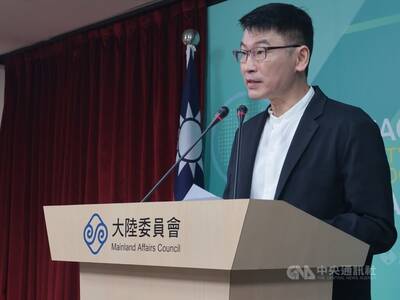The Tourism Administration last week revised campsite management guidelines to relax land use regulations and encourage more campgrounds to operate legally under regulatory oversight.
Taiwan has a total of 1,905 camping grounds, of which only 161 are operating legally, Tourism Administration data showed.
Among the 1,744 illegal operators, 80 percent are on land designated for agriculture or forests.

Photo: Taipei Times
Operators are reluctant to comply due to current campsite management guidelines, which limit the scope of camping grounds operations, as well as ineffective inspections conducted by local governments and official organizations.
The agency has now relaxed restrictions to allow certain areas of unregistered campgrounds to fall under “leave nothing behind” camping, a principle requiring campers to leave the area exactly as they found it.
The revisions were implemented immediately in a bid to encourage campgrounds to operate under regulatory oversight.
Campgrounds come under different regulations and responsible authorities based on their land use classification.
Relevant laws may include the Urban Planning Act (都市計畫法), the Regional Plan Act (區域計畫法), the National Property Act (國有財產法), the Forestry Act (森林法), the Building Act (建築法) and the Soil and Water Conservation Act (水土保持法).
According to current regulations, campgrounds on agricultural or forest land must not exceed a total area of 1 hectare, of which the combined space for campsite facilities, sanitation facilities and management offices must not exceed 10 percent and is capped at 660m².
Moreover, for agricultural and pastoral land, sanitation and management areas must not exceed a combined 30 percent of that cap, while for forest land, the limit is 10 percent.
The 660m² limit is only enough space for 14 tents, which is too limited for viable operations, the agency said, leading to operators neglecting to apply for permits.
A campsite management and supervision task force convened by the central government concluded that 90 percent of the land area for those campgrounds could still fall under “leave no trace” camping, which prohibits permanent infrastructure including gravel, concrete or wooden decks.

The Japan-Taiwan Exchange Association has cautioned Japanese travelers to be vigilant against pickpockets at several popular tourist spots in Taiwan, including Taipei’s night markets, the Yongkang Street area, Zhongshan MRT Station, and Jiufen (九份) in New Taipei City. The advisory, titled “Recent Development of Concerns,” was posted on the association’s Web site under its safety and emergency report section. It urges travelers to keep backpacks fully zipped and carried in front, with valuables placed at the bottom of the bag. Visitors are advised to be especially mindful of their belongings when taking photos or speaking on the phone, avoid storing wallets and

ENDORSING TAIWAN: Honduran presidential candidate Nasry Afura said that Honduras was ‘100 times better off’ when it was allied with Taipei The Ministry of Foreign Affairs yesterday said it would explore the possibility of restoring diplomatic relations with Honduras based on the principle of maintaining national interests and dignity. The ministry made the remarks in response to reporters’ questions regarding an article titled: “Will Taiwan Regain a Diplomatic Ally?” published in The Diplomat on Saturday. The article said Honduras’ presidential election in November could offer Taiwan the chance to regain an ally, as multiple candidates have promoted re-establishing diplomatic relations with Taiwan. Honduras severed diplomatic ties with Taiwan in March 2023 in favor of Beijing, but since switching its diplomatic recognition,

Scoot announced yesterday that starting in October, it would increase flights between Taipei and Japan’s Narita airport and Hokkaido, and between Singapore and Taipei. The low-cost airline, a subsidiary of Singapore Airlines, also said it would launch flights to Chiang Rai in Thailand, Okinawa and Tokyo’s Haneda airport between December and March next year. Flights between Singapore and Chiang Rai would begin on Jan. 1, with five flights per week operated by an Embraer E190-E2 aircraft, Scoot said. Flights between Singapore and Okinawa would begin on Dec. 15, with three flights per week operated by Airbus A320 aircraft, the airline said. Services between Singapore

The Mainland Affairs Council (MAC) yesterday announced a ban on all current and former government officials from traveling to China to attend a military parade on Sept. 3, which Beijing is to hold to mark the 80th anniversary of the end of the Second Sino-Japanese War. "This year marks the 80th anniversary of the end of World War II and the Republic of China’s victory in the War of Resistance [Against Japan]," MAC Deputy Minister and spokesperson Liang Wen-chieh (梁文傑) told a regular news briefing in Taipei. To prevent Beijing from using the Sept. 3 military parade and related events for "united